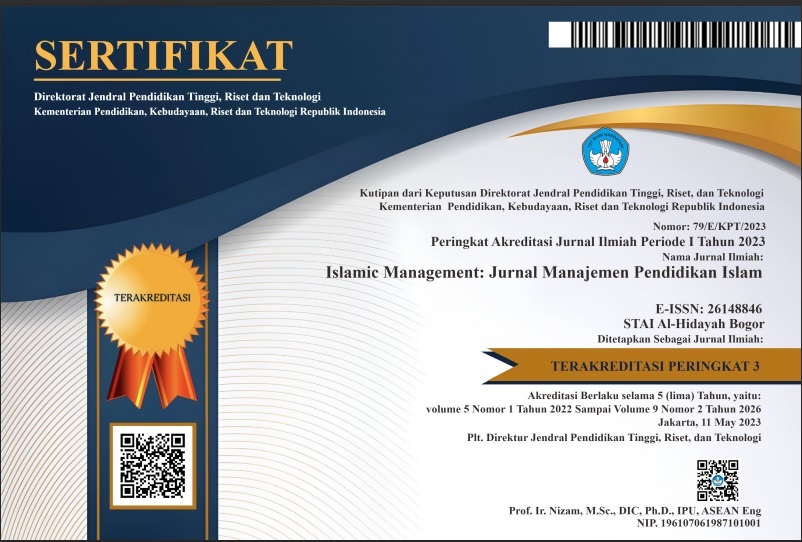Implementasi Manajemen Pendidikan Berbasis Prilaku di MTS Yatashi Kota Bogor
DOI:
https://doi.org/10.30868/im.v5i01.1436Abstract
In general, the purpose of this study is to reveal the implementation of behavior-based education management at MTs Yatashi, Bogor City. However, the specific objectives of this research are: (1) To determine the implementation of behavior-based education management in MTs Yatashi Bogor City, (2) To determine the implementation of behavior-based education at MTs Yatashi Bogor City. This research is a field research (Field Research) that is conducting research directly to the location to obtain and collect data. The research carried out in the field is examining qualitative problems, namely research data procedures that produce descriptive data in the form of written or spoken words from people and observed behavior. The implementation of behavior-based education management at MTs Yatashi Bogor City is pursued through four alternative strategies in an integrated manner, namely: (a) integrating behavioral education content that has been formulated into all subjects, (b) integrating behavioral education into daily activities at school, (c) integrate behavioral education into programmed or planned activities, (d) build collaborative communication between schools and parents of students. From the discussion above, it can be concluded that the implementation of behavior-based education management is carried out through two activities, namely Intracurricular, namely through teaching and learning activities that have been scheduled by the Deputy Head of curriculum and extracurricular activities, namely scouting, religion, Islamic arts, Youth Red Cross (PMR) which is scheduled by the Deputy Head of the field. to students and the values embedded are religious, disciplined, honest, responsible, tolerance, love the homeland, hard work, care for the environment, love peace, care for social, creative and independent.
Â
Keywords: management, education, behavior
References
Ardi Wijayani, Novan. (2012). Manajemen Pendidikan Karakter; Konsep dan Implementasinya di sekolah. Yokyakarta: PT. PustakaMadani.
Koesoema, Doni. (2007). Pendidikan Karakter Strategi Mendidik Anak di Zaman Global. Jakarta: Gramedia widiasarana Indonesia.
Koesuma, Doni. (2011). Pendidikan Karakter; Strategi Mendidika Anak di Zaman Global. Jakarta: Grafindo.
Kusuma, Darma, dkk. (2011). Pendidikan Karakter Kajian Teoridan Praktek di Sekolah. Bandung: PT. Remaja Rosda Karya.
Ma’mun, Asmani, Jamal. (2012). Buku Panduan Internalisasi Pendidikan Karakter di Sekolah. Yogyakarta: Diva Press.
Marimba, Ahmad D. (1989). Pengantar Filsafat Pendidikan Islam. Bandung: PT. Al-Ma’arif.
Moleong, Lexy J. (2013). Metodologi Penelitian Kualitatif. Bandung: PT. RemajaRosdakarya.
Moleong, Lexy. (2009). Metodologi Penelitian Kualitatif. Bandung: Remaja Rosdakarya.
Munir, Abdullah. (2010). Pendidikan Karakter Membangun Karakter anak sejak dari Rumah. Yogyakarta: Pedagogia.
Permendiknas RI No. 22 Tahun 2006 tentang Kegiatan Ekstrakurikuler.
Permendiknas RI No. 39 Tahun 2008 tentang Pembinaan Kesiswaan.
Puskur Balitbang Kemdiknas. (2010). Pembinaan Pendidikan Karakter di Sekolah Menengah Pertama. Jakarta.
Puskur Balitbang Kemdiknas. (2010). Pengembangan Pendidikan Budaya dan Karakter-Bangsa. Jakarta.
UU RI No. 20 tahun 2003 tentang Sistem Pendidikan Nasional.
Zuchdi, Darmayanti. (2013). Pendidikan Karakter; Konsep Dasar dan Implementasi di PerguruanTinggi. Yogyakarta: UNY Press.
Downloads
Published
How to Cite
Issue
Section
Citation Check
License
Authors who publish with this journal agree to the following terms:
- Authors retain copyright and grant the journal right of first publication with the work simultaneously licensed under a Creative Commons Attribution License that allows others to share the work with an acknowledgment of the work's authorship and initial publication in this journal.
- Authors are able to enter into separate, additional contractual arrangements for the non-exclusive distribution of the journal's published version of the work (e.g., post it to an institutional repository or publish it in a book), with an acknowledgment of its initial publication in this journal.
- Authors are permitted and encouraged to post their work online (e.g., in institutional repositories or on their website) prior to and during the submission process, as it can lead to productive exchanges, as well as earlier and greater citation of published work (See The Effect of Open Access).







